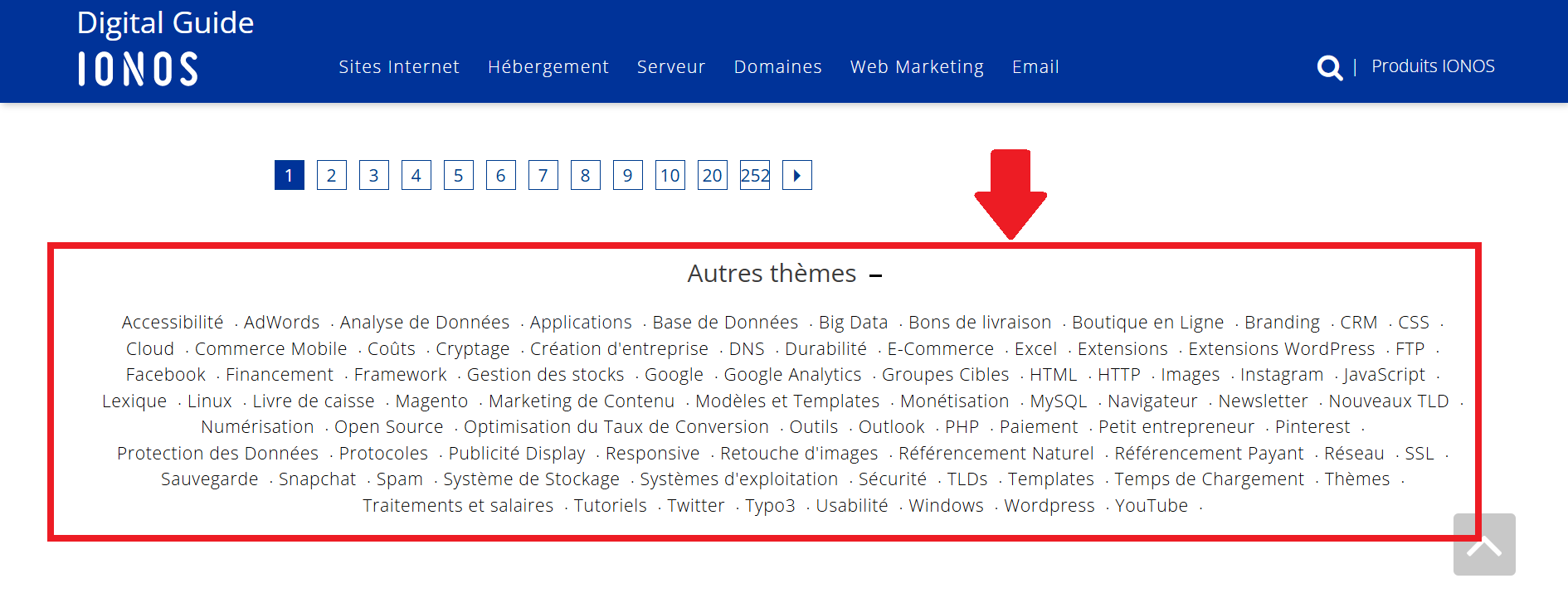In website editors, it is possible to categorize different types of content, themes or products by keywords. These tags are particularly useful for Internet users who want to have a quick overview of the website and navigate easily. There are many other forms of tags, such as hashtags, meta tags, or HTML tags.
Tags: definition¶
“Tags” is an English term meaning “labels”. Using tags on websites, blogs or online magazines helps create a more intuitive structure using specific keywords. There search is thus facilitated for Internet users. By assigning tags to articles, product pages or guides in your CMS (content management system), visitors to the pages will be able to find similar content with a single click or by entering the corresponding tags. The main purpose of the tags function is therefore to optimize the usability of your website.
What are the different types of tags?¶
When creating websites or in online marketing, one can notice that there are many different types of tags. We present the main ones to you below:
Tags for indexing¶
When talking about tags, most people think of clusters of keywords relating to different themes on a web page. A blog post about vegetarian cooking or electric cars would place terms like “vegetarian” or “electric car” as tags. If users search for these keywords in the website’s search functions, articles with similar tagged topics will appear.
In this way it is also possible to integrate a tag cloud to a website, with which you can, for example, highlight particularly popular tags with different font sizes. These keywords therefore play an important role for clarity, user-friendliness and visit duration Internet users. For search engine optimization, however, tagging is not as important, because tags primarily optimize the user experience design, as well as the graphical interface, which therefore also includes the search function.
Social tagging¶
What we call social tagging can be translated as “social marking”. This process refers to the tags that Internet users place to make interesting or similar content accessible. Unlike indexing and tagging by content creators, social tags therefore refer to a community indexing. In the context of social tagging, we find the generic term “folksonomy” to designate the entry of these keywords. This can be represented, among other things, in the form of a tag cloud.
Instagram, Flickr and Pinterest are well-known examples of social tagging: these platforms allow their users to classify images by themes and categories using tags. Creating bookmarks or hashtags also falls under this domain. It is worth mentioning that social tagging does not follow no precise indexing rulesthis is why all users can participate in the categorization and accessibility of content.
Hashtags¶
Unlike indexing and social tagging, hashtags do not allow a direct link to a theme or content between websites. Hashtags are certainly also used for thematic structuring, but it is not a question of local tagging, specific to a website, but rather of cross-site tagging. Hashtags are therefore mainly used on social networks, for example for social media marketing, hashtag marketing or for social network management tools. Individuals, businesses or online stores can create their own hashtags and thus achieve greater reach, target groups or promote campaigns.
Meta tags¶
Meta tags are inserted, among other things, in the HTML header of the respective web page. They contain information about the content of the page, for example description and keywords. Unlike tag clouds on blogs, these tags transmit to search engines important information on a web page. This is why they are important for search engine optimization and good web SEO through SEO content.
The following meta tags are important ranking factors:
- Description
- Keywords
- Content type
- Page subject
- Robots and Revisit, instructions for crawling them
THE page title (Title-Tag) is often called a “meta title”, but is not strictly speaking a meta tag.
HTML tags¶
HTML tags are used to structure a web page document and to provide web browsers with specific instructions on how to display it. These HTML tags therefore relate to the basic structure of the page, the integrated multimedia content, the different fonts as well as the forms and links. Start and end tags are usually represented with curly braces.
To illustrate this point, here is a list of important HTML tags:
-
<!DOCTYPE>: specifies the type of document -
<html>: defines the document as an HTML document -
<head>: places the metadata in the HTML header of the document -
<h1>…</h1>: indicates an H1 title -
<p>…</p>: represents the start and end of a paragraph, automatic line return and new paragraph -
<i>…</i>: writes the text in italics -
<a href="https://www.ionos.fr/digitalguide/URL du lien">thème du lien</a>: includes a link
Online Marketing Tags¶
Tags are also used in online marketing and e-commerce. They are represented in the form of code snippets used to analyze the performance of web pages and the success of the marketing strategy implemented. They make it possible, among other things, to evaluate the activities and behavior of visitors to the site, the pages viewed and conversion rates, and to put advertising retargeting into practice. Some of the most common tags in online marketing include:
- Counter tag: counts visits to pages on a website
- Conversion tag: counts the conversion rates of a website and allows you to analyze the success of a marketing action such as an advertising campaign
- Remarketing/retargeting tag: allows you to target users who have already visited the website to then tailor advertisements
- E-commerce tag for Universal Analytics: Google Analytics data collection tool provides comprehensive reporting on transactions and purchasing and usage behavior
The different online marketing tags therefore all fulfill different functions. For this reason, we recommend that you implement effective tag management. This is especially true if your website has a complex architecture or in the event of a change of supplier and all kinds of new projects.
Good SEO is necessary to get more reach and higher search engine rankings. With IONOS, benefit from the free online SEO Audit tool to optimize your website.
What are the advantages of tags?¶
The benefits of tags vary depending on their type. In the rest of this article, we mainly focus on the advantages offered by tags on platforms such as YouTube, on blogs or in online marketing.
Youtube¶
YouTube tags are search terms and keywords that you can add to your videos. They play an important role in taking advantage of the YouTube algorithm and improving YouTube SEO. Well-placed tags increase the chances that posted videos will be considered relevant by YouTube’s algorithm, and therefore be ranked higher. In this way, you increase your reach and views and attract more visitors. Tagging on YouTube should always be targeted and not disproportionate so as not to be considered spam. To add tags, go to YouTube Studio under the video and click “Content” or, for new uploads, “More options”.
Blogs¶
Tags in blogs consist of specific keywords that relate to themes and contents of the articles posted. Thanks to them, visitors can find similar articles more easily via the search function. Additionally, you can use a tag cloud to highlight particularly interesting or popular topics to optimize dwell time and traffic to your website.

Online Marketing¶
Tags in online marketing offer many advantages, especially for online stores. As users view pages or purchase products, online marketing tags record activities, analyze click or purchase behavior and help optimize marketing campaigns and advertising measures. This not only increases your conversions, but also refines your business strategy.




